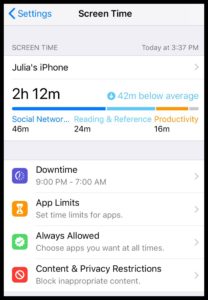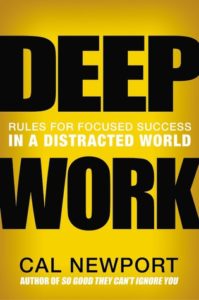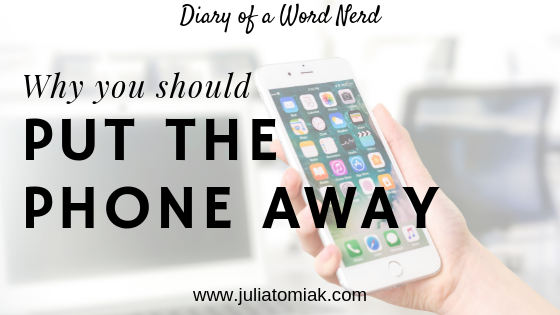Something must be up if the people who make the technology are encouraging us to use their technology less.

The current version of iOS on my iPhone has “Screen Time” settings. These are tools to help me decrease my use of certain apps and the phone in general. I set hours for “downtime” when almost all the app icons on my phone go dim, and if I try to open an app, I’m reminded not to use my phone. I can also set daily time limits for categories of apps, like “social media”, to make sure I don’t waste too much time scrolling through Facebook. Currently, my social media time limit is an hour, but I might change that to 30 minutes because…
A lot of people from a lot of different places are telling us that too much time with our phones isn’t good for us. We’re not just wasting time, we’re ruining our ability to concentrate and THINK. Here are a few things that have me reconsidering my relationship with my phone.
Brain Drain research
An article called “Brain Drain: The Mere Presence of One’s Own Smartphone Reduces Available Cognitive Capacity” describes interesting research on how phones affect concentration. According to the article, our smart phones interfere with our concentration because they are always present and are particularly good at attracting our attention. (Some studies show we respond to the sounds of our phone the same way we respond to the sound of our name!)
This is a problem, because every day we are bombarded with tons of environmental information, but we have limited cognitive ability (brain power) to process it. When our attention goes to our phones, even subconsciously, that further decreases our ability to think and process information.
The authors who conducted the Brain Drain research found the mere presence of a smart phone, even if it was turned off, face down, or silenced, decreased participants’ attention and decreased their performance on cognitive tasks. Based on these results, the researchers strongly recommend defined and protected periods of separation from smart phones to decrease interruptions and increase available cognitive capacity.
The point: If you are doing something important that requires focused thought, put your phone in another room so it doesn’t sap your precious brain power.
Researchers also suggest that using tools to limit, filter, and track smart phone use could decrease digital distraction. (Aha! The Screen Time settings are a good thing).
 Deep Work
Deep Work
Cal Newport is an associate professor of computer science at Georgetown University. He also likes to study the impact of technology on society. His book, Deep Work, champions focused thinking in a noisy world.
In an interview with The New York Times, Newport explained some important concepts from Deep Work. First, “deep work” is focusing on an intellectually demanding task without any distractions. Newport says we need more of it. The term “attention residue” describes what happens when people switch focus between tasks. Every time we shift our attention, e.g. to check email, our ability to think and reason drops for a significant amount of time. If we constantly check apps and devices, we are living in a state of attention residue, and our mental capacity suffers. Finally, Newport says, concentration takes practice, and if we always attend to phone notifications and social media posts, we will never learn how to focus and think deeply.
“If you… always whip out your phone and bathe yourself in novel stimuli at the slightest hint of boredom… when it comes time to think deeply about something, your brain won’t tolerate it.” ~ Cal Newport
The point: Limit distractions so that you can train your brain to focus and work efficiently on important tasks. Make time for deep work.
Newport also recommends embracing boredom and quitting social media. He believes the cost of social media, in terms of distraction, outweighs the benefit, which is why he advocates Digital Minimalism (Which is the title of his book to be released February 2019.)
Technology is designed to be addictive
In an interview on CBS’s 60 Minutes, Tim Harris, former Google product manager, spoke about smart phone design. According to Harris, smart phone apps and content are supposed to be habit forming so the consumers will use them for long periods of time. Harris said, “Inadvertently, whether they want to or not, [designers] are shaping the thoughts and feelings and actions of people…There’s always this narrative that technology’s neutral. And it’s up to us to choose how we use it. This is just not true.”
The point: Don’t let the technology companies hack your brain. Know how technology can help and harm you, and be smart about how you use it.
I really like certain things about my phone- Google Calendar, reminders, the ability to communicate easily with my child who is away at college. But more and more, I’m backing off phone use. I turn off my phone around nine and leave it in the kitchen overnight, and I don’t look at it the next day until I’ve done my morning devotion, stretched, and made the kids lunch. (Unless the weather is bad, and I need to know if school is canceled.)
I also try to “batch” things, like checking email and social media only at certain times of day, (e.g., over lunch), and I turn off notifications so that I’m choosing when to open apps, not the other way around. Also, I will put my phone on do not disturb or even in another room while I’m doing deep work (writing, reading, piano), so that I can FOCUS on important tasks.
How do you feel about your relationship with your smart phone? What do you do to keep that relationship “healthy”?
Thanks for getting nerdy with me!



Newport’s books sound interesting. I know I’m on my phone too much.
Thank you for sharing your thoughts.
I have the book “How to Break Up with Your Phone” in my to-read pile, because I feel like I need to change my relationship with my phone. I also keep my phone downstairs when I go to bed, and I tried screen time limits for a bit but found them annoying (which means they are necessary, but still). You’ve given me even more food for thought, Julia!
I just finished this book and it was a great way to start 2019! I didn’t implement all of the recommendations, but did change some of the ways I approach phone use over the past few weeks.
Good to know, Megan. We don’t always have to adopt everything a book/ guru tells us to do, but it is nice to get some ideas. Good luck with your phone boundaries!
Great, Dana! And thanks for sharing the book suggestion. I haven’t heard of that one, but it sounds like something I’d be interested in.